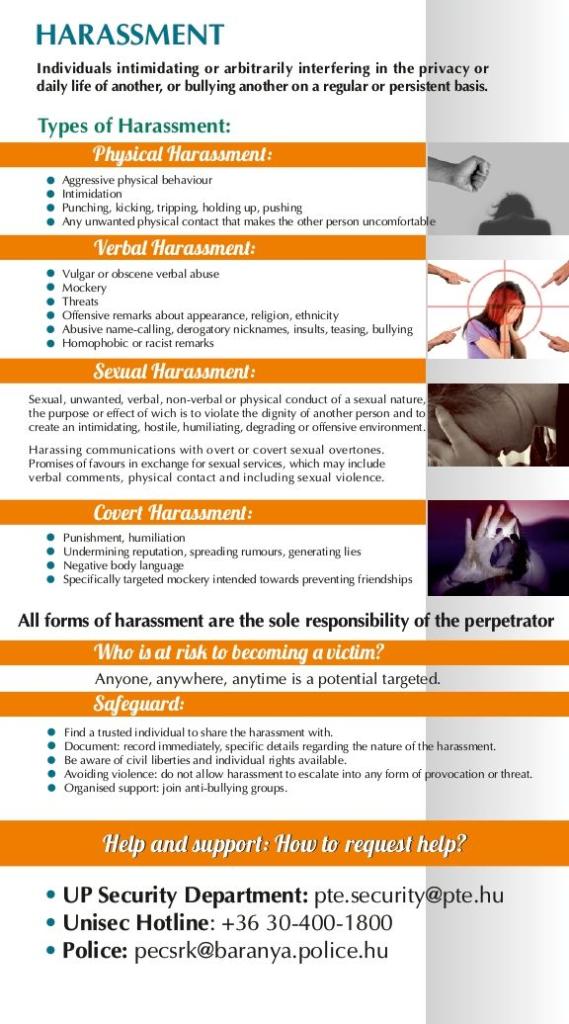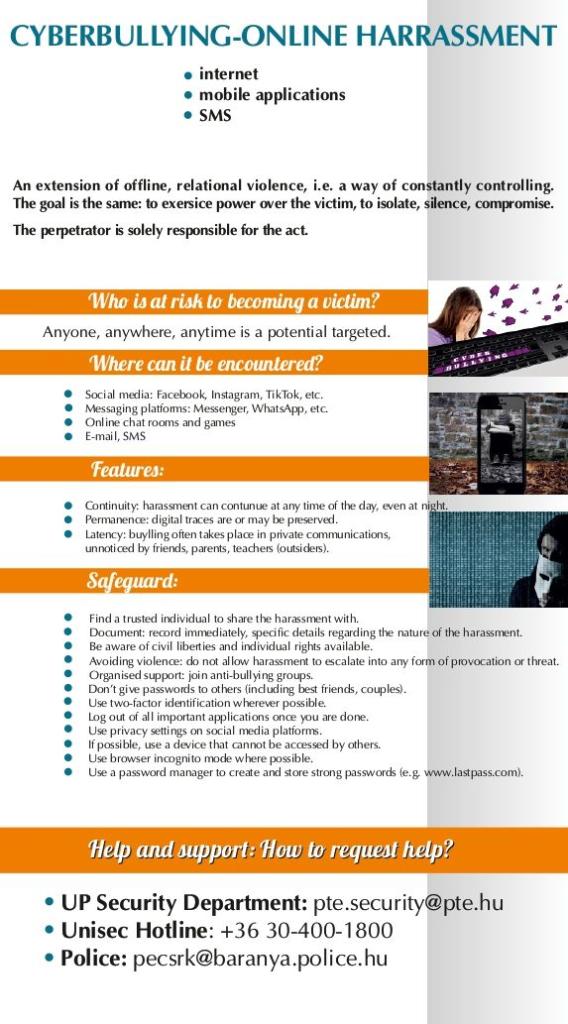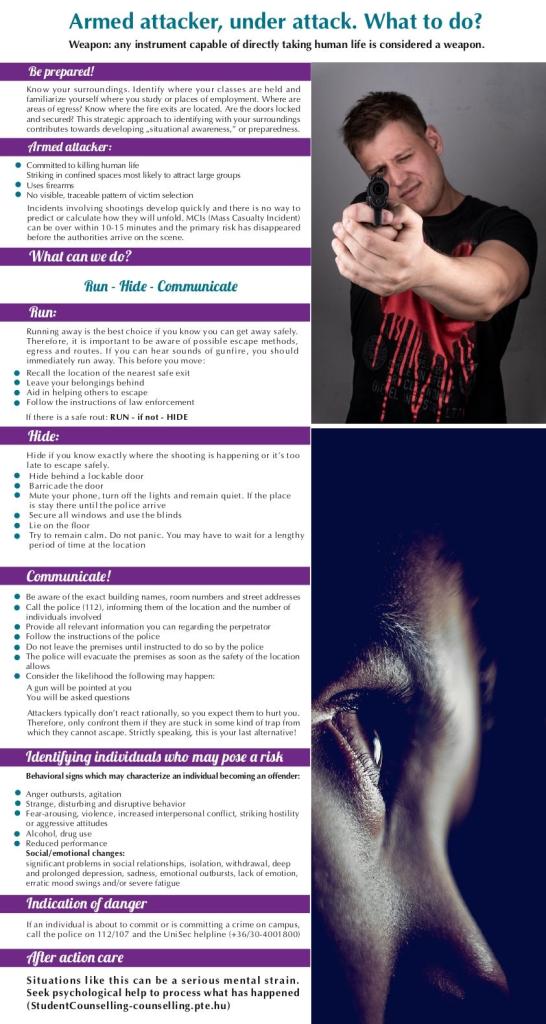Dear Students,
According to the Global Peace Index, Hungary and the city of Pécs are considered to be exceptionally safe in both global and regional comparison. In line with this fact, the University of Pécs is determined to render the highest possible quality of services to its students. This includes, inter alia, that we strive to facilitate a calm, secure and inclusive environment. We put great efforts in maintaining this peaceful and supportive community which results in a remarkably safe and secure learning experience.
As in many aspects of life, a key component to reach this objective is prevention, therefore the University of Pécs has prepared the following Safety & Security Guide in order to maximize the security and well-being of everyone on campus. Safety recommendations of this Guide are in line with the Hungarian Criminal Code, UP’s regulations, and experience-based suggestions and ideas.
Please read through the following advices that may prove to be helpful in your everyday life and even in the unlikely event of an immediate security risk. We wish you a safe and pleasant time in Pécs!
If you have any questions, please feel free to contact us! Official guidance and support is kindly provided by:
|
The basics:
- Be careful and aware of your surroundings!
- Be prepared!
- Have backup support!
- Have safety plan & solutions!
Accommodation - Private places, dormitories
Students own a number of items that are attractive to thieves/criminals so they occasionally target student houses.
To reduce risks, you should:
- Discover the living area day & night, obtain experiences for safe and/or less friendly places
- Lock the doors & windows
- Never let anyone you do not know in
- Never let unknown persons who have no authorised access/cards into the dorm
- Do not leave valuable things in or near to windows, doors
Communicate any suspicious circumstances to the receptionists, security guards or the police (#112)!
Keeping private properties, valuables safe
- Don’t make yourself a target when carrying your values!
- Keep your bag closed!
- Don’t carry large amounts of cash!
- Have an insurance!
- Don’t leave your laptop, tablet or cell phone unattended, not even in the car!
- Mark your properties (engraving, photography, etc.)!
- Use PIN or pattern code!
- Record your bike’s serial number (engrave an ID onto the frame – you can do it at the uni with police cooperation!
- Always lock your bike to bike racks!
ATM Security & Data Protection
- Prefer ATMs on campus sites, next or near to banks or in well-lit, high-traffic areas of the city.
- Never tell anyone your PIN code!
- Beware of strangers who offer to help you!
- Don't allow others to distract you while you're banking!
- Block your card if stolen as soon as possible!
- Check your bank balance regularly!
- Inform your bank about your new address as soon as possible!
- Beware of fraudsters posing as organisations!
- Report the loss of any important documents to authorities!
Getting home
- Check the arrivals of the last buses you can take, be familiar with the schedule of the city’s public transportation: https://mobilitas.biokom.hu/en/timetable
- Save the telephone number of a taxi company in your phone.
- Do not pick up hitchhikers.
- Park your car in a well-lit, busy area.
Nights out/Safe Dating
- Have backup – make sure that you have a friend you trust to check up on you during your programme – Always follow this rule!
- Have your mobile phone charged.
- Leave a pub with friends.
- Avoid walking alone at night.
- Avoid dark areas; use well-lit, well-travelled routes.
- If being followed, go to the nearest public place.
- Avoid short-cuts at night.
- If you see someone else in trouble, shout for help, call the police (#112).
- Meet in a public place for the very first time.
- Use your own transportation.
- Watch your alcohol intake.
How to reduce risks of unconfortable situations?
- Trust your instincts: if something does not feel right, you have to leave.
- Be assertive, communicate simply and clearly.
- Yell, scream, make noise in any way you can.
- If you are at a party, don't leave with a person you don't know well.
- Remember that alcohol and drugs compromise your ability to make decisions.
- Avoid secluded places.
- Set sexual limits and communicate them.
- Beware of partners who disregard your requests.
Tips for responsible party hosting
- Don’t plan potentially dangerous physical activities.
- Provide plenty of non-alcoholic beverages and food.
- Arrange transportation for guests.
- Call the police if someone insists on driving home after drinking – there is zero tolerance on alcohol intake when driving in Hungary.
- Look for signs of intoxication and have a plan to deal with anyone who drinks too much.
- Don’t let someone who is drunk leave alone.
Tips for safe(r) drinking
- Never accept drinks from strangers.
- If you leave a drink unattended, it’s safer to get a new one as drinks might get spiked with drugs.
- Know how much you can drink sensibly ... and stick to your limit.
- Never drink for the sake of drinking.
- Don't drink on an empty stomach.
- Pace yourself.
- Remember that alcohol lowers your guard and can seriously affect making safe judgements.
Recognise signs of alcohol problems
There can be changes in the person’s drinking pattern (volume, frequency), behaviour, personality – offer or ask for help to get him/her out of trouble.
Be aware of the consequences of alcohol overconsumption:
- memory loss
- involvement in violence
- getting into trouble with police
- medical treatment for overdose
- trying drugs
There is zero tolerance in Hungary, which means that the possession, use, exchange, manufacture or selling of illegal drugs (including marihuana cigarettes/“weed”) in Hungary is prohibited by Criminal Law! Violations are dealt with under the direction of the Police.
Further, regulary updated information on illegal drugs: https://drogriporter.hu/tiltott-szerek-jegyzekei/
Party & Rape Drugs
- If you leave a drink unattended, it’s safer to get a new one as drinks might get spiked with drugs.
- Most drugs act in 15-20 minutes or faster and may last up to 10 hours.
- Mixing them with alcohol can cause death.
Signs which refer to someone’s got in trouble with drugs
Behavioural and/or physical changes: sleepiness, disorientation, sickness, confusion, vomiting, memory loss, aggression, dilated or constricted pupils.
If you experience these kind of signs, give/ask for help to get the person guided and saved!
Any form of sexual activity without consent is a sexual assault and counts as a crime in Hungary.
What is consent?
Always an active, affirmative, conscious, direct, and voluntary agreement in sexual activity.
Asking and giving consent is an integral part of showing your partner that you respect and appreciate her/him.
Remember, it is always OK to say NO!
What is not consent?
Responses like these clearly mean NO:
- Silence, or not responding
- “You’re not my type”
- “I don't know...”
- “I’m not sure if I want this”
- “I’m scared”
- “Please stop”
- “I don’t know if I want to”
These are definitely dissent!
Sexual harassment can be physical, verbal, non-verbal, written and visual.
Important steps to take right away after an assault
- Call a family member or a friend you trust
- Call the police & ambulance (112) or go to the nearest hospital emergency
- Do not clean any part of your body and clothes, so the hospital staff can collect evidence
- Feelings of shame, guilt, fear, and shock are normal. It is important to get counselling from a trusted professional so ask for help to make your feelings clear
According to the Hungarian Criminal Code you are not obliged to file a police report if you decide not to do so – it is up to you.

Occurs when a bully targets a victim using online communication methods such as texting or social media posts to threaten, abuse, or degrade someone. It’s a crime that doesn’t require physical strength or a face-to-face meeting. Anyone with an internet connection and a digital device can be a cyberbully.
Because of these, we have to be careful with our digital footprint.
As information becomes public, anyone can be easily discovered, and tracked down which is useful not just for potential employers but criminals as well.
- Be aware of who can view your profile!
- Avoid inappropriate language, comments and jokes that may cause problems and may lead to cyberbullying!

The vast majority of bomb threats are hoaxes designed to cause panic, intimidate the public, or mislead the Police. Nonetheless, if you perceive any threats of mass violence, no matter how serious it seems, always report it to the Police by calling 112.
Immediate steps if you perceive a threat of mass violence:
If you receive a telephone threat:
- stay calm and listen carefully
- try to keep the caller talking and alert someone nearby to dial 112
- if displayed, note the number of the caller
- write down as much detail as possible
If a threat is received via text message, do not reply, forward or delete it. Note the number of the sender and follow police advice.
If a threat is received via email or social media:
- do not reply, forward or delete
- note the sender’s email address or username
Such threats are considered a crime under the Criminal Code!
Fortunately, it is very difficult to acquire a handgun in Hungary and therefore the chance to find oneself in an “active shooter situation” is highly unlikely.
Who is an active shooter? An active shooter is actively engaged in killing or attempting to kill people in a populated area. The situations evolve quickly and can be over within 10-15 minutes, therefore it is important to be relatively prepared to act quickly to protect yourself.
GET OUT, HIDE, TELL
GET OUT/RUN: Getting out is the best option if you can escape safely. If you hear something that could be gunshots, don’t wait: get out!
- Make the decision quickly and think of the direction before you move.
- Evacuate regardless of whether others follow or not.
- Do not bunch together, large groups are easier targets.
- Leave your belongings behind.
- Help others with disabilities escape, if possible.
- Close any doors behind you.
- Do not run across open spaces.
- Follow instructions that the Police or Security gives you.
HIDE if you don’t know exactly where the shooting is happening or it’s too late to escape safely:
- Get behind a lockable door if you can.
- Barricade the door, close and lock windows, lower the blinds.
- Silence your phone, turn off the lights and stay quiet.
- Try not to panic and wait until you have clear instructions from the Police to move.
TELL/COMMUNICATE:
- Provide as much detail about the targeted place and the intruder as possible.
- Follow instructions of the 112 Operator or Security.
- Do not leave the room unless advised to do so by the Police.
Officers will evacuate you when it is safe to do so! They may:
- Point guns at you
- Treat you firmly
- Question you
- Be unable to distinguish you from the attacker
How to identify a person at risk?
There is no way to accurately predict who can become an active shooter, but there are behaviours that can indicate the potential risk. Recognise the signs of behavioural changes, social/emotional/mental problems.
If someone is committing or about to commit violence, call 112, and the Campus Security personnel!
If you are worried about something you observe, contact the UP Security Department at pte.security@pte.hu or call +36304001800 (accessable via FB Messenger, Viber, What’sApp, etc.).
What to do with suspicious items?
- Do not touch!
- Try to find the owner in the area.
- If you still think it’s suspicious, move away to a safe distance, report it to security staff, or dial 112.







